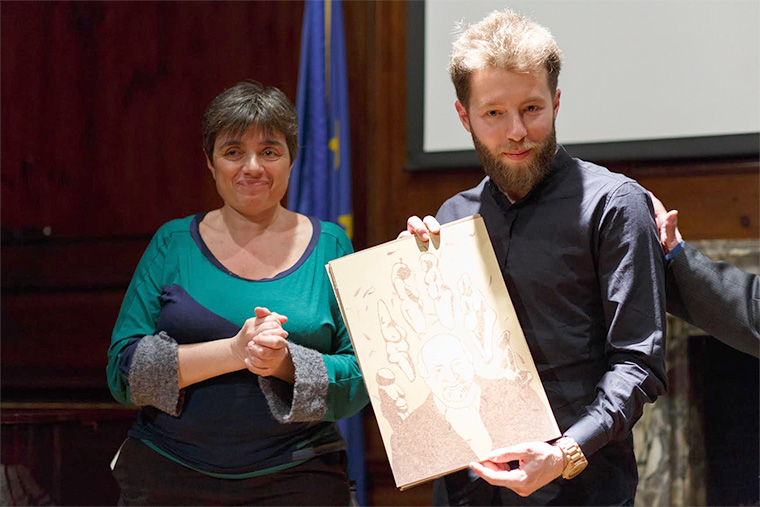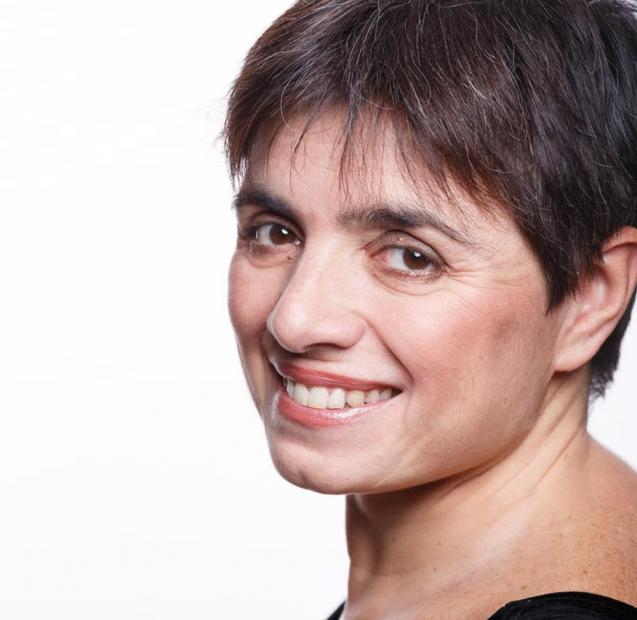Laura Caparrotti is an artist, educator, journalist, playwright, lecturer, consultant and Italian dialect coach for Boardwalk Empire, a curator and a panelist for NYSCA, who has been working to spread the Italian culture through theater in New York since 1996.
After years of professional theatre in Italy, she relocated to New York, where she has directed and performed in shows at The Kitchen, The Fringe Festival, The Walter Reade Theater at Lincoln Center, the Cell, the Flea, and at the Casa Italiana Zerilli Marimò, among other venues. Laura started the Double Theater Experience and was the Assistant to the Director of the Off Broadway production of Eduardo De Filippo’s Souls of Naples, featuring John Turturro. She is the world-wide representative of the De Curtis Family, and the curator of Excerpts of a Prince Named Totò, the official traveling exhibition about the Italian iconic actor Totò. She is the Founding Artistic Director of the Italian Theater Company in NY called Kairos Italy Theater.
Laura Caparrotti continues working with the goal of spreading the Italian culture and cultivating the knowledge of Italy in the States, and vice versa. In 2013, Laura starred in Scena! Italian Theater Festival NY, the first Annual Italian Theater Festival to take place in all 5 NY Boroughs. Laura continues being an ambassador for Italian language and culture, and she is determined to create a network of artists and educators to spread her love for Italy in the US. Her mission is to create a cultural exchange program between Italy, the US and the international community.

IN SCENA Italian Theater Festival NY Closing Night with the Mario Fratti Award at the IIC. Ph by Stefano Corso. Laura Caparrotti and Emanuele Aldrovandi received the Award Mario Fratti
Laura Caparrotti, how many years have you been in New York, and why did you decide to move to Manhattan?
I have been here for 20 years. I decided to do a nine months experience in NY in 1996 after coming for a brief summer school in 93, 94, and 95. I loved NY so much that I needed to stay here… for 9 months that became 20!
When did you start the first Italian theater company and in which city?
Here in NY. I come from a theater career in Italy and over there with some friends we were already working on having our own group. When I came here, I started to do some Italian theater. It was successful and I continued… and now KIT is the Italian theater company in NY (and maybe in the States). That means that we focus only on Italian theater, Italian authors, Italian plays… Italy all the way!
Laura, since your productions are bilingual, can you briefly tell me some of the shows you have produced and who your audience is?
To briefly tell is really difficult, let’s say that we have produced works by Franca Valeri, Pier Paolo Pasolini, Dino Buzzati, Ennio Flaiano, Alberto Bassetti, and some original works written by me in collaboration with other authors such as Uberto Kovacevich. We presented many readings as well and so many other cultural events over 16 years. The audience has changed: first strictly lovers of Italy, then lovers of theater, then curious people, then anyone else. We are working in order to have everyone understanding that Italian theater is theater, great theater! The bilingual aspect add value to the productions, people is intrigued and open to hear lines in a different language. The problem is that many theaters don’t want to risk and choose to do always the same kind of theater. I hope we can change this point of view soon.
You are the founder and the director of the “IN SCENA Italian Theater Festival NY”; how is that different from the Kairos Italy Theater, that you are also the founder of?
In Scena brings Italian theater from Italy. The shows are professional shows, that tour Italy. KIT presents mostly its own productions, made in New York. That is the only difference. Both professionals, both touring theater, both Italian.
Do your shows only take place in New York City?
No, we tour a lot, in all the United States. KIT presents also productions in Italy and in other countries and brings US theater to Italy, like we did in April bringing the acclaimed Bedlam company to Rome with ”Cry Havoc”, in collaboration with our Italian partner KIT Italia on the occasion of the 400th anniversary of Shakespeare’s death.
In the past you created a teacher-character called “Professor Margherita” to teach Italian through the theater, how did you come up with this idea?
Not sure, to be honest. I was asked to do a presentation on Italy and I thought of a professor diva, like the one I have met in a play I never remember the title of. Since the first time, 16 years-ago I believe, I shaped the show, adding a sketch written by actor and author Uberto Kovacevich on the differences of 6 cities in Italy. The sketch was the base for the entire show which has traveled everywhere, making Professor Margherita a real star. I am thinking of making her working more in the near future. She has so much to give and she loves being the center of attention.
Can you describe the benefits of teaching Italian language, literature, and culture through theater?
Theater is life. Theater is intimate. Theater is a dialogue between the artist and the audience in a place and time always unique and not repeatable. Therefore, theater is an intense experience that could move and shape people. It is not so much about teaching, it’s about sharing our culture and making the audience embracing it and loving it!
Which of your productions was the most successful and why?
Beside Professor Margherita, all the productions related to a title or a theme already known in the United States have more audience and easier promotion. The Decameron is the example. We tour with The Decameron, we have easily sold out performances and many schools bring their students to see it. It’s definitely more difficult to promote contemporary playwrights.
What were the greatest challenges you had to face in New York?
Maybe to have the Italian theater recognized as theater that could be enjoyed by any kind of audience. When you work on something with passion, you don’t feel the challenge. You just feel the passion. I have to say though that lately I am noticing that I might have to overcome a challenge: to bring the Italian people – and by Italian I mean the ones from Italy, the latest immigration – to the theater.





























